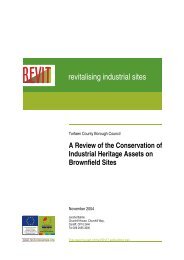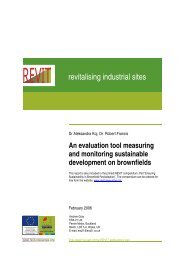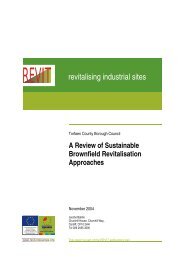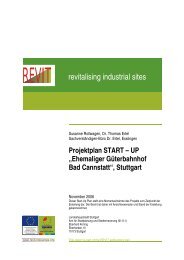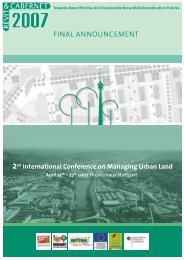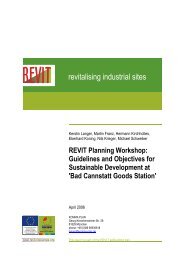DG State Aid – Control and Regeneraton of Deprived Urban ... - REVIT
DG State Aid – Control and Regeneraton of Deprived Urban ... - REVIT
DG State Aid – Control and Regeneraton of Deprived Urban ... - REVIT
You also want an ePaper? Increase the reach of your titles
YUMPU automatically turns print PDFs into web optimized ePapers that Google loves.
integration, will also normally not favour certain undertakings or the production <strong>of</strong><br />
certain goods <strong>and</strong> will hence not fall under Article 87(1) EC Treaty 13 .<br />
Finally, even measures designed to promote economic activities in deprived urban<br />
areas need not constitute state aid in the meaning <strong>of</strong> Article 87(1) EC Treaty. In line<br />
with the former Guidelines on state aid for undertakings in deprived urban areas, aid<br />
to individual shops <strong>and</strong> enterprises in such areas that carry on a purely local activity<br />
will normally 14 not affect trade between Member <strong>State</strong>s. Further, where the activity <strong>of</strong><br />
the beneficiaries is the subject <strong>of</strong> intra-Community trade, <strong>and</strong> therefore competition<br />
with other enterprises might be distorted by state aid, aid up to a maximum <strong>of</strong> EUR<br />
100,000 over a three-year period may nevertheless be granted without prior<br />
Commission approval (the ‘de minimis’ rule). The de minimis rule is set out in<br />
Commission Regulation (EC) N° 69/2001 on the application <strong>of</strong> Articles 87 <strong>and</strong> 88 <strong>of</strong><br />
the EC Treaty to de minimis aid 15 . If all the conditions on the application <strong>of</strong> the de<br />
minims rule specified in the above-mentioned Regulation are met, such aid does not<br />
fulfil the requirements in terms <strong>of</strong> effects on competition <strong>and</strong> trade <strong>and</strong> hence does<br />
not fall under Article 87(1) EC Treaty 16 .<br />
4.3 Regeneration measures which involve compatible state aid<br />
Exemption regulations, guidelines <strong>and</strong> frameworks lay down the policy the<br />
Commission has adopted regarding various types <strong>of</strong> aid. Many <strong>of</strong> these will be<br />
relevant for a holistic regeneration strategy that integrates <strong>and</strong> reconciliates diverse<br />
sectoral policies.<br />
The Commission’s notice on the expiry <strong>of</strong> the guidelines on state aid for undertakings<br />
in deprived urban areas 17 emphasises that the non-prolongation <strong>of</strong> the guidelines<br />
does not imply that state aid for deprived urban areas is no longer possible. Such aid<br />
may be found compatible under the existing rules applicable to state aid, or,<br />
depending on the circumstances, directly under Article 87(3)(c) <strong>of</strong> the EC Treaty.<br />
Article 87(3)(c) states that aid to facilitate the development <strong>of</strong> certain economic<br />
activities or <strong>of</strong> certain economic areas can be considered to be compatible with the<br />
common market, provided that such aid does not adversely affect trading<br />
conditions to an extent contrary to the common interest. When examining whether<br />
aid is compatible directly under Article 87(3)(c) the Commission, firstly, will take into<br />
account the Community’s objectives (which may also include regeneration <strong>of</strong><br />
deprived urban areas) <strong>and</strong>, secondly, will analyse whether the proposed aid<br />
measure is appropriate <strong>and</strong> proportionate to its targeted objectives <strong>and</strong> does not<br />
have disproportionate effects on competition <strong>and</strong> trade. In other words, the<br />
compatibility <strong>of</strong> state aid depends on balancing its negative effects with its positive<br />
effects. In this regard it is up to the Member <strong>State</strong> to demonstrate the existence <strong>of</strong><br />
clearly defined market failures 18 or <strong>of</strong> the situations when markets do not lead to<br />
13 Commission Regulation (EC) No. 2204/2002 on the application <strong>of</strong> Articles 87 <strong>and</strong> 88 <strong>of</strong> the EC Treaty to state<br />
aid for employment, OJ L 337, 13.12.2002, p. 3-14, recital 6.<br />
14 The exception would be an enterprise located sufficiently close to the border that clients might be tempted to<br />
cross the border for their purchases or for the services provided.<br />
15 OJ L 10, 13.1.2001, p. 30-32.<br />
16<br />
Note that this Regulation is not applicable to the transport sector or activities linked to the production,<br />
processing or marketing <strong>of</strong> products listed in Annex I to the EC Treaty. For the latter sector Commission<br />
Regulation (EC) No. 1860/2004 <strong>of</strong> 6 October 2004 on the application <strong>of</strong> Articles 87 <strong>and</strong> 88 <strong>of</strong> the EC treaty to<br />
"de minimis" aid in the agricultural <strong>and</strong> fisheries sectors (OJ L 325 <strong>of</strong> 28.10.2004) applies.<br />
17 OJ C 119, 22.5.2002, p. 21.<br />
18 For example, market failures in l<strong>and</strong> <strong>and</strong> property development, enterprise development, etc.<br />
5



